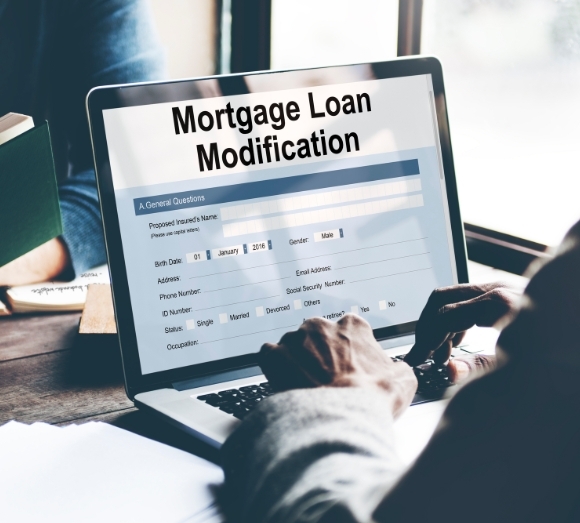Trusted By Thousands Of Homeowners For Over 20 Years.
Florida Home Loan Modification Agreement - The Process
You may need to refinance your loan when you have trouble making the mortgage payments or want to get a lower interest rate. However, a loan modification might be a better choice, and you can get an application from a mortgage lender in Florida.
Loan modifications and refinances both have benefits and drawbacks, so it's crucial to do plenty of research before making a decision.
Let's focus on some of the differences between a loan modification and refinance. You can learn when mortgage modification is better for you and how to apply for either of them.
What's a Loan Modification with Mortgage Payments?
The loan modification agreement is a change from the original loan terms of your current mortgage. Unlike refinance, the loan modification doesn't pay things off and replace it with a new mortgage. Instead, it changes the conditions of the loan.
You should know that some loan modification programs negatively impact your credit history and score. If you're current on the mortgage, it might be better to review other options and apply for a refinance.
Overall, you may only get a loan modification agreement through the current lender because they have to approve the terms. Sometimes, a mortgage modification can adjust:
- Loan Term Changes - When you're having trouble making monthly payments, you could modify the loan and extend the terms. That way, you have more time to repay it, reducing the amount you spend each month.
- Interest Rate Reduction - Sometimes, interest rates are lower currently than when you locked in the mortgage loan. Therefore, you could modify it and get that lower price to reduce your monthly payments.
- Loan Structure Changes - You could modify the loan to be a fixed-rate loan instead of having an adjustable-rate mortgage. That can be beneficial if you're now on a fixed income and require a predictable monthly payment amount.
- Principal Forbearance - The lender might agree to set the principal amount aside so that you can pay it back later. This reduces your payments and makes things more manageable. However, such mortgage modification programs are rare. Generally, you only get this if there is no other way to avoid foreclosure. Plus, you must subscribe to a particular repayment plan to qualify and stay on top of those new monthly payments. Overall, the lender might agree to settle some of the principal once you've completed the repayment plan.
Lenders aren't required to accept the mortgage modification request or to renegotiate the principal. Therefore, it's often harder to do than refinancing, and you must show proof of hardship. Each investor and lender on the loan (FHA, Freddie Mac, Fannie Mae, etc.) has various standards to determine who qualifies and what modifications they provide.
You could receive offers from different settlement companies to get a loan modification, which is helpful if you are behind on your mortgage. Such companies negotiate with the lender for you and can make the process easier. However, they're often the middleman and charge you for the service that a loan servicer offers for free.
If you choose to work with one of those companies, research the provider before agreeing to the contract. You don't need high-fee agreements if you're currently behind on your mortgage.
When Do You Need a Mortgage Loan Modification?
There could be times to choose a loan modification before refinance, such as when you're behind on the mortgage payments or underwater. Let's take a look at them now:
Loan Is Underwater
The underwater mortgage means that you owe more money on the home than the property appraises for. In a sense, the loan goes underwater if you miss payments early in your term or live in areas with falling property values. Typically, a loan modification can assist here.
Most lenders don't let you refinance more than the house is worth. However, there could be streamlined options that let you change the term and rate without an appraisal. Still, you must meet very specific criteria to qualify.
Generally, it's better to request a mortgage loan modification directly to simplify the entire process and get you out of the situation.
Require a Principal Balance Reduction
It's not possible to reduce the mortgage principal with refinancing. Instead, you should consider a loan modification to help if you might go into foreclosure soon. Plus, a mortgage loan modification offers other mortgage relief options than a refinance.
You're Behind on the Monthly Payment
Lenders don't let you refinance unless you're current on the monthly payments. Sometimes, refinances for an underwater loan require you to have six on-time payments consecutively before you qualify. Any missed mortgage payments mean you can't do a refinance, so a loan modification could be beneficial.
Generally, a loan modification is great if you can catch up on the monthly payments before applying.
The Loan Modification Process
Each loan provider has various standards for a loan modification. They typically require you to use a loan modification application and provide financial documentation to prove that you require this modification. Some of the documents needed include:
- Proof of Income - The lender has to know that you can't cover the mortgage with your current income. Proof of income often includes contracts or salary agreements from an employer stating your annual or hourly income. Your lender could ask for profit/loss balance information for self-employed individuals.
- Most Recent Tax Returns - The lender is likely to need your tax returns when you apply for a modification.
- Bank Statements - These can confirm your assets or lack thereof.
- Hardship Statement - Your lender must know why you need the modification. A hardship letter tells them why you can't make monthly loan payments or pay the entire loan balance. Consider including supplementary documentation to show your situation. Things like termination letters and medical bills might increase your approval chances.
Contact your current lender to ask how you should apply or if you qualify. They can refuse your request. If that happens, you might want to seek out a Florida loan modification attorney for assistance.
However, a real estate attorney costs money, which you might not have if you're in financial hardship right now.
What Does Mortgage Refinance Mean?
Though you're focused on getting a mortgage loan modification right now, you could also refinance, which is when you replace the existing loan with a new mortgage. This lets you change your loan terms and use the equity to get cash from the home. You may refinance to:
- Shorten Your Terms - A refinance can give you a short term. The monthly mortgage payment increases, but you own the home sooner and save money from paying less interest.
- Lengthen the Mortgage Term - Lower the monthly mortgage payments by getting a longer term. This helps you avoid foreclosure if your current income is lower than when you applied for the loan.
- Get a Lower Interest Rate - Refinancing can help you get lower interest rates than when you initially got the loan.
- Change the Loan Type - It could be beneficial to refinance if you've got over 20 percent equity in the home. For example, you pay mortgage insurance with an FHA loan if you put down under 10 percent. However, people cancel private insurance on conventional loans when they reach 20 percent equity. Refinancing to a conventional loan could be a smart move.
- Cash-out Refinance - The cash-out refinance lets you draw money from the home's equity to cover various expenses. However, you take a high-balance loan to get the difference in cash. Mortgage interest rates are often lower than with credit cards or other loan types, saving you money.
You don't have to use your current lender to refinance as you do with a loan modification. Therefore, if you're unhappy with the lending company, you can switch to a new system.
When Do You Need to Refinance?
When is it better to refinance than getting a loan modification? They include:
You're Not Underwater
Special refinance programs help you adjust the underwater loan terms, but it's easier to refinance if you have equity.
You Wish to Use the Home Equity
Immediately take cash out of the home equity to cover bills, which you can't do through loan modification.
How to Refinance a Loan
You must choose a lender, submit the application, and provide financial documentation for the underwriting. The lender often lets you lock in the interest rate, too. That protects you from market interest rate movements.
Once your rate is locked in, the lender underwrites the loan to ensure you qualify for the refinance. Most of them require an appraisal before closing on the new loan. That ensures that the lender isn't loaning more money than the home is worth. Once those are complete, you get a closing disclosure, which tells you about the closing costs and terms of the loan.
Finally, you attend a closing meeting and sign the new loan.
Conclusion
Generally, a loan modification is much different than a refinance. When you choose loan modification, you change your loan terms with your lender. Most of them only agree to this if you are immediately at risk of foreclosure. Some people choose a loan modification to change the terms of the existing mortgage when the house loan is underwater.
Regardless, it's crucial to seek help from a personal finance professional. Florida Homeowner Solutions is the best company to handle loan modifications so that you can keep your home. Contact a representative to learn more today!
What Is a Modification?
A loan modification is a permanent restructuring of the mortgage where one or more of the terms of a borrower's loan are changed to provide a more affordable payment, although, the payment is not always affordable.
When Can a Loan Modification Be an Option?
- You are not able to refinance your loan because of too many missed payments.
- You were unemployed for a period of time, but now have 6 months of work history.
- You are several months behind on your mortgage payments or likely to fall behind soon.
Loan Modification Details
Possible Reduction in Interest Rate
Will Take Longer To Pay Off New Loan
Bank Will Take Equity From You During Process
Should Take NO MORE Than 3 Months
Must Have 6 Months Work History
Might Make Payments More Affordable
How Does a Loan Modification Work?
Step #1: Your lender allows you to apply for the Loan Modification.
Step #2: You will send in the following:
- A request for the Mortgage Assistance Form
- A complete signed IRS Form 4506-T or 4506-T EZ
- Your most recent signed and filed Federal Tax Return
- Most recent paystubs
- Bank statements
Step #3: Your lender allows you to apply for Loan Modification. The modification process should take 2-5 months.
Unfortunately, many banks have made getting a Loan Modification far more difficult than it is meant to be. Some banks will only consider borrowers who are two to three months behind on their mortgages, even though Federal guidelines clearly do not require this. Your lender may "lose" your paperwork repeatedly or claim that you never sent in the requested documents.

Pros
Cons
Load Modification Worksheet
Download the form to identify if you would be approved for a loan modification.
We Help You Keep Your Home, Sell Your Home,
Or We Buy Your Home!
Contact Florida Home Owners Solutions Today! Its FREE!
